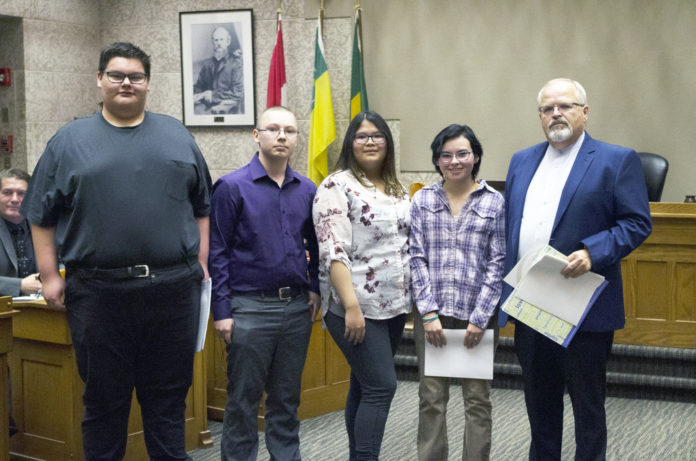
A group of Prince Albert students are looking to reduce stereotypes and promote sobriety one house at a time.
For the last several months, the Wesmor Public High School student group Students Against Destructive Decisions has poured its time into what they’re calling the Sober House Project. The grassroots campaign has a simple but ambitious goal: get residents across Saskatchewan to post “sober house” signs on their door letting people know that alcohol is not welcome in their home.
On Monday, they secured the support of the city’s most influential body—Prince Albert City Council—following a presentation during Monday’s meeting. For students Camryn Corrigal, Linden Howlett-Samm, Paywapin Young and Ayla-Rae Parenteau, it’s been an exhausting, but completely worthwhile, pursuit.
“This was probably the most exciting thing for us,” Corrigal said following Monday’s presentation. “This was the largest step to finally getting the support of our whole community, and to push it into Prince Albert and further.”
“We chose the sober house because it means something to us, not because we were supposed to, (and) I think this is our biggest action,” Howlett-Saam added.
The inspiration for the idea started with a book by Harold R. Johnson called ‘Firewater: How Alcohol is Killing my People (and yours)’. Johnson, a Harvard grad, navy veteran and lifelong resident of Northern Saskatchewan, was devastated by the impact alcohol was having among Indigenous people. He estimated that at least 50 per cent of all deaths in the north could be attributed to alcohol.
His memoir reflects those concerns while issuing a challenge to Saskatchewan residents to start talking about those negative effects. It was a challenge the students eagerly accepted.
“It took us about seven months to get here,” Corrigal said. “To get further it could take us a year or it could take us five years. We’re going to keep going and we’re going to keep taking it as far as we can.”
The group hopes the signs will serve as a reminder to anyone struggling to stay sober that there are thousands of people who live their lives without alcohol. They refer their campaign to spread sobriety signs across the province as a “quiet revolution” and so far it’s been incredibly successful. The group has even received requests for signs from as far away as British Columbia and Ontario.
They also hope to counter stereotypes about drinking among First Nations people. The group has already made presentations and visited career fairs to hand out sober house signs. They said the large number of enthusiastic respondents show there is already a large number of sober Indigenous people in the area.
After the meeting, Mayor Greg Dionne said it was encouraging to see Prince Albert youth taking such a stand. He also wasn’t surprised with their early successes.
“When the youth speak out, people seem to listen because they don’t speak out very often,” he said following the presentation. “I’ve got to give the crew from Wesmor credit. They were factual. They were knowledgeable. They were ready (and) they have a plan.”
For all members of Students Against Destructive Decisions, the opposition to alcohol comes from personal experience. They want to see a province where sobriety is the norm, rather than the exception. Their experiences show what happens when that isn’t the case.
For Ayla-Rae Parenteau, it was a family friend killed by an impaired driver that spurred her into action. She’d like to see sober house signs pop up on doors all over the city, while sparking a conversation about the devastating effects alcohol can bring.
“My family has lost friends to people who were under the influence (and) it affects them a lot of days. I just don’t like to see them that way,” Parenteau said. “It’s unnecessary. If we can show that there are sober people out there, maybe other people will be inspired to think, ‘hey, you don’t need alcohol to have fun in life or to live a good life.’”
Anyone who wants a sober house sign can get one by emailing soberhouseproject@gmail.com. Residents are also invited to share their stories of alcohol recovery at the Sober House Project Facebook page.

